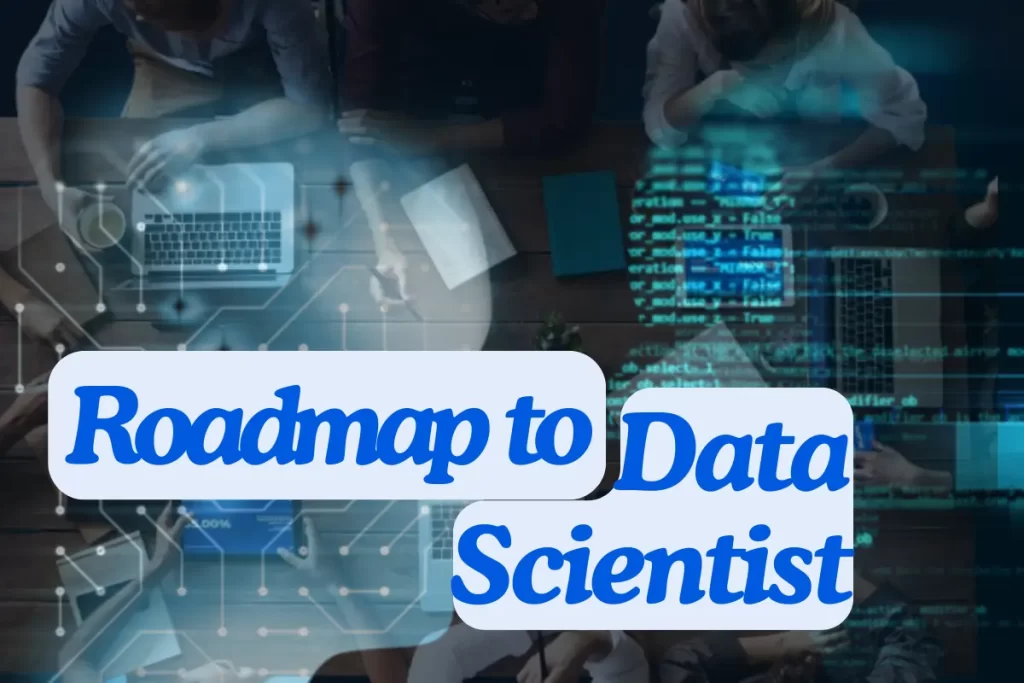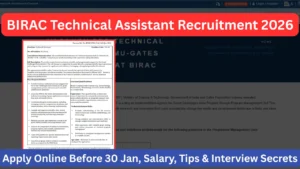बिना Computer Science Degree के Data Scientist बना मुमकिन? 2026 में ये है पूरा प्लान

क्या आप भी Data Science के exciting career में आना चाहते हैं लेकिन सोचते हैं कि बिना Computer Science Degree या महंगे Bootcamp के ये मुमकिन नहीं? मेरी खुद की कहानी ये साबित करती है कि अलग बैकग्राउंड से आकर भी इस फील्ड में कामयाबी पाना संभव है। Physics की पढ़ाई करने से लेकर UK की एक कंपनी में Data Scientist बनने तक के मेरे सफर और 2026 के लिए प्रैक्टिकल सलाह यहाँ पढ़ें।
Data Scientist Profile 2026: एक नजर में
| पहलू | 2026 की मांग और जानकारी | |
|---|---|---|
| जरूरी स्किल्स | Python, SQL, ML Algorithms, Statistics, Data Visualization (Tableau/Power BI), Cloud Basics (AWS/Azure) | |
| शैक्षणिक योग्यता | STEM Degree (Physics, Math, Stats, Engineering) जरूरी, लेकिन CS Degree अनिवार्य नहीं। | |
| पोर्टफोलियो का महत्व | GitHub Projects, Kaggle Profile, Technical Blog – ये Resume से ज्यादा ताकतवर हैं। | |
| शुरुआती वेतन (भारत) | ₹8 – ₹15 लाख/वर्ष | 5+ Years Experience के बाद ₹25+ लाख/वर्ष संभव। |
| करियर ग्रोथ | Data Scientist → Senior DS → ML Engineer/Data Science Manager |
1. मेरी कहानी: Physics के Student से Data Scientist तक का सफर
मेरी शुरुआत Physics से हुई। घर में Maths और Science का माहौल था। University of Surrey से Physics में First-Class Degree और Master’s किया, साथ ही National Physical Laboratory में Research भी किया। हालाँकि, मुझे एहसास हुआ कि Traditional Research मेरी स्पीड के अनुकूल नहीं थी।
मोड़ तब आया जब मैंने DeepMind के AlphaGo (AI जिसने Go गेम का World Champion हराया) के बारे में देखा। Reinforcement Learning और Markov Chains जैसी तकनीकों ने मुझे हैरान कर दिया और मैंने Machine Learning और Data Science को गहराई से समझना शुरू किया। मेरे Physics और Maths के strong background ने इस नई Field को सीखने में बहुत मदद की।
2. Data Science सीखने का Step-by-Step रोडमैप (2026 के लिए)
Data Science सीखना तब आसान हो जाता है जब आप इसे छोटे-छोटे Modules में बाँट लें।
स्टेप 1: गणित और सांख्यिकी की नींव मजबूत करें (Math & Statistics)
यह सबसे जरूरी चरण है। अगर आप STEM Background से हैं तो आपका काम आसान है।
- Linear Algebra: Matrices, Vectors – ML Models की बुनियाद।
- Calculus: Derivatives, Optimization – Algorithm Training के लिए।
- Statistics & Probability: Distributions, Hypothesis Testing, A/B Testing – Data से Insights निकालने के लिए।
स्टेप 2: प्रोग्रामिंग भाषाएँ सीखें (Programming Languages)
- Python: Data Science की “सबसे जरूरी” भाषा। Syntax, Functions, Loops, Classes से शुरुआत करें।
- SQL: Database से Data निकालने का सबसे Important Tool। हर Interview में पूछा जाता है।
स्टेप 3: Data Science Libraries और Tools में महारत हासिल करें
- Data Manipulation: Pandas, NumPy
- Data Visualization: Matplotlib, Seaborn, Plotly
- Machine Learning: Scikit-learn (शुरुआत के लिए बेस्ट)
- Big Data/Advanced: PySpark, TensorFlow/PyTorch (बाद में सीखें)
स्टेप 4: Real-World Projects बनाकर Portfolio तैयार करें
सिर्फ Theory काफी नहीं है। Kaggle पर जाएँ और Beginner-Friendly Competitions में हिस्सा लें। अपने GitHub Profile पर 3-4 अच्छे Projects जरूर रखें, जैसे:
- Sales Prediction Model
- Customer Sentiment Analysis
- Image Classification Project
3. पहली Data Science Job पाने के लिए जरूरी Strategies (2026 Edition)
पहली नौकरी पाना सबसे कठिन चरण है। मैंने खुद 300+ Applications भेजे थे। 2026 में Competition और बढ़ा है, इसलिए Smart काम करें।
Strategy 1: GitHub Profile को अपना “Live Resume” बनाएँ
- Clean, Documented Code लिखें।
- README File में Problem Statement, Approach और Results अच्छे से समझाएँ।
- Regularly Update करते रहें।
Strategy 2: Technical Blogging शुरू करें
- Medium, Dev.to, या अपने ब्लॉग पर लिखें।
- किसी Concept को आसान भाषा में समझाएँ या अपने Project के बारे में लिखें।
- यह Communication Skills और Technical Depth दोनों दिखाता है।
Strategy 3: Networking और Preparation
- LinkedIn पर Industry Professionals से जुड़ें।
- “Take Home Assignments” को Serious Practice की तरह Treat करें।
- Behavioral Interviews के लिए अपनी कहानी और Projects को Confidence के साथ बताना Practice करें।
4. Data Scientist Salary 2026: भारत और Global Trends
| अनुभव स्तर | भारत में अनुमानित वार्षिक पैकेज (INR) | Global / Remote Roles (USD) | जिम्मेदारियाँ |
|---|---|---|---|
| Fresher / Entry-Level | ₹8 – ₹15 लाख | $70,000 – $90,000 | Basic Models बनाना, Data Analysis, Senior DS के अधीन काम। |
| Mid-Level (3-5 Years) | ₹15 – ₹25 लाख | $90,000 – $130,000 | End-to-End Projects, Model Deployment, Juniors को Guide करना। |
| Senior (5+ Years) | ₹25 – ₹50+ लाख | $130,000 – $200,000+ | Project Architecture, Team Leadership, Business Strategy। |
नोट: Product-Based कंपनियाँ (FAANG, Unicorns) Service-Based कंपनियों से काफी ज्यादा Offer करती हैं।
अक्सर पूछे जाने वाले सवाल (FAQ)
Q1: क्या Computer Science Degree बिना Data Scientist बन सकते हैं?
A1: हाँ, बिल्कुल! मेरा Background Physics का है। जरूरत है Core Skills (Programming, Maths, Stats) सीखने और उन्हें Practical Projects के जरिए साबित करने की।
Q2: 2026 में सबसे ज्यादा Demand किन स्किल्स की है?
A2: Generative AI (LLMs – ChatGPT जैसे), MLOps (Model Deployment & Management), और Cloud Platforms (AWS SageMaker, GCP Vertex AI) की Knowledge बहुत बड़ा Advantage देगी।
Q3: क्या Bootcamp जरूरी है?
A3: नहीं। ऑनलाइन Resources (Coursera, edX, YouTube, Kaggle Learn) और Self-Discipline काफी हैं। Bootcamp की High Fees के बराबर Value आप खुद मेहनत से पा सकते हैं।
Q4: पहली Job के लिए कितने Projects पर्याप्त हैं?
A4: 3-4 Detailed Projects काफी हैं, बशर्ते वे अलग-अलग Problems (जैसे Prediction, Classification, NLP) को Solve करते हों और आपको उनकी पूरी समझ हो।
निष्कर्ष: आपकी यात्रा शुरू होती है यहाँ से
Data Science में कोई एक Fixed रास्ता नहीं है। सफलता का राज है Curiosity, Consistent Practice, और एक Strong Portfolio बनाने में। आज से ही Python सीखना शुरू करें, एक Kaggle Account बनाएँ, और पहला Simple Project शुरू करें। यह फील्ड आपके Problem-Solving Skills को Value देती है, सिर्फ Degree को नहीं।
अगला कदम: आज ही Kaggle पर “Titanic: ML from Disaster” Competition Join करें – यह दुनिया का सबसे Famous Beginner Project है।








2 thoughts on “बिना Computer Science Degree के Data Scientist बना मुमकिन? 2026 में ये है पूरा प्लान”